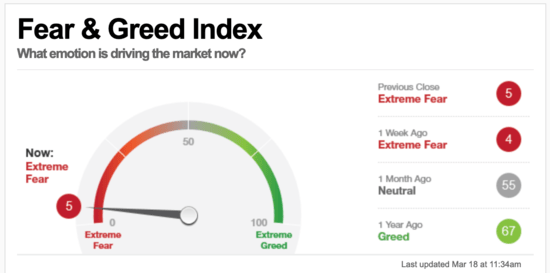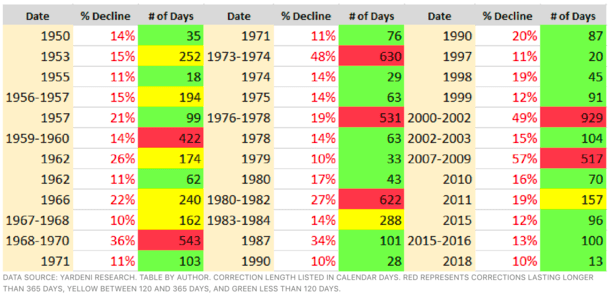There’s been lots of chatter around Wall Street that this could be an unprecedented time to buy stocks on the cheap, given the market carnage related to the coronavirus.
One asset manager, Ricky Sandler of Eminence Capital, has even gone as far as to recommend that you refinance your mortgage and use the proceeds to purchase stocks.
Is this a good idea, a bad idea, or a reckless idea? Well, that depends.
The Dow Is Now Sub-20K
A month ago, the Dow was looking like it was about hit 30,000, which would have been cause for celebration, and the unveiling of new baseball caps with “Dow 30,000” emblazoned on the front.
Instead, we’re now below 20,000 as of the time of this writing, thanks to another massive drop this morning. Does anyone have those old hats lying around?
For reference, the Dow first surpassed 20,000 in January 2017, so we’ve basically just erased three years of gains in the matter of a month.
For the contrarians, this is an exciting development. An opportunity to buy equities at 2017 prices.
But who knows what the future has in store. Are stocks going to crumble even more in the short-term?
While some are calling the selloff overdone, we are living in extraordinary times. When was the last time you remember the world effectively shutting down?
The last time nations across the globe closed their borders? The last time the NBA, NHL, MLB, world soccer, and virtually all movies, concerts, and restaurants came to a halt?
Simply put, this is a big deal, and the economic ramifications are going to be tremendous. We are in uncharted territory.
Extreme Fear Is Ruling the Moment

Currently, we are living in Extreme Fear, based on the Fear & Greed Index. That’s as bad as it gets for stocks.
It was previously just a “Fear” rating back on February 27th, before things got even worse.
CNN defines Extreme Fear as a time when the number of stocks hitting 52-week lows exceeds those hitting highs and is at the lower end of its range.
Again, for contrarians, this probably sounds pretty appetizing. If everyone is selling, there’s probably an opportunity to buck the trend and buy some quality stocks at a discount.
But there’s also the fear of catching a falling knife.
Ultimately, these market movements can take a long time to play out, much longer than we anticipate.
Just think about the longest bull run in history, which began in early 2009 and abruptly ended with the coronavirus last week.
No one expected it to go on as long as it did, yet the market kept chugging higher and higher until something unforeseen stopped it in its tracks.
Market Corrections Don’t Tend to Last Very Long

Now some good news and an argument to apply for a cash out refinance so you can get in on the action.
Most stock market corrections, defined as a drop of 10% or more, only last for a short period of time. And the market always goes higher over time.
So one could argue that it’s virtually a no-brainer to invest when the Dow is at 20k if it was previously close to 30k.
Per Yardeni Research, there have been 36 corrections in the S&P 500 since 1950, with the worst being a 57% drop during the Great Recession.
And the average correction time, which is peak to trough, is roughly 196 calendar days. The longest was 929 days in 2000-2002, and the shortest 13 days in 2018.
The Great Recession correction lasted 517 days, which while long, doesn’t seem too bad given the circumstances.
The current correction has the S&P down around 30%, and there’s no sign it’s going to turn around at the moment.
Given the large decline, with more possibly to come, it could take quite a bit of time for stocks to bottom.
But they will eventually bottom and reverse course, it’s just a matter of when.
Best Not to Time the Market
Instead of selling all your stocks in a panic, it’s generally best not to do anything. The old adage about timing the market is true, it’s basically impossible.
And if you don’t touch anything, you haven’t really lost anything. It’s all a paper loss (or gain) until you actually sell.
However, you can add to your position(s) when you feel there’s an opportunity.
It’s just difficult to do so when you don’t have a lot of cash on hand, or if you need to deploy that cash toward your monthly mortgage payment and everyday bills instead.
That’s where a cash out refinance could come in handy, though the major caveat here is you’d be borrowing against your home.
So first you need to be able to afford the higher mortgage payment associated with a larger loan balance, and second, you’d have to be comfortable making such a move in the face of Extreme Fear.
For those thinking a HELOC could work, there are two issues that come to mind.
First, they are tied to the prime rate, which is adjustable and will likely increase over time as the stock market rises.
Secondly, in times of crisis, it’s not unheard of for mortgage lenders to freeze credit lines, so if you attempt to open a line and save it for a rainy day, it might get frozen along the way.
The cash-out argument makes sense though – with mortgage rates close to all-time lows, and stocks currently well off their all-time highs, it could be a recipe for some big gains.
Just imagine if those magical 0% mortgage rates were actually real!
But as the chart above shows, it may take some time for things to turn around, especially now with the world facing its most unique crisis in modern history.

